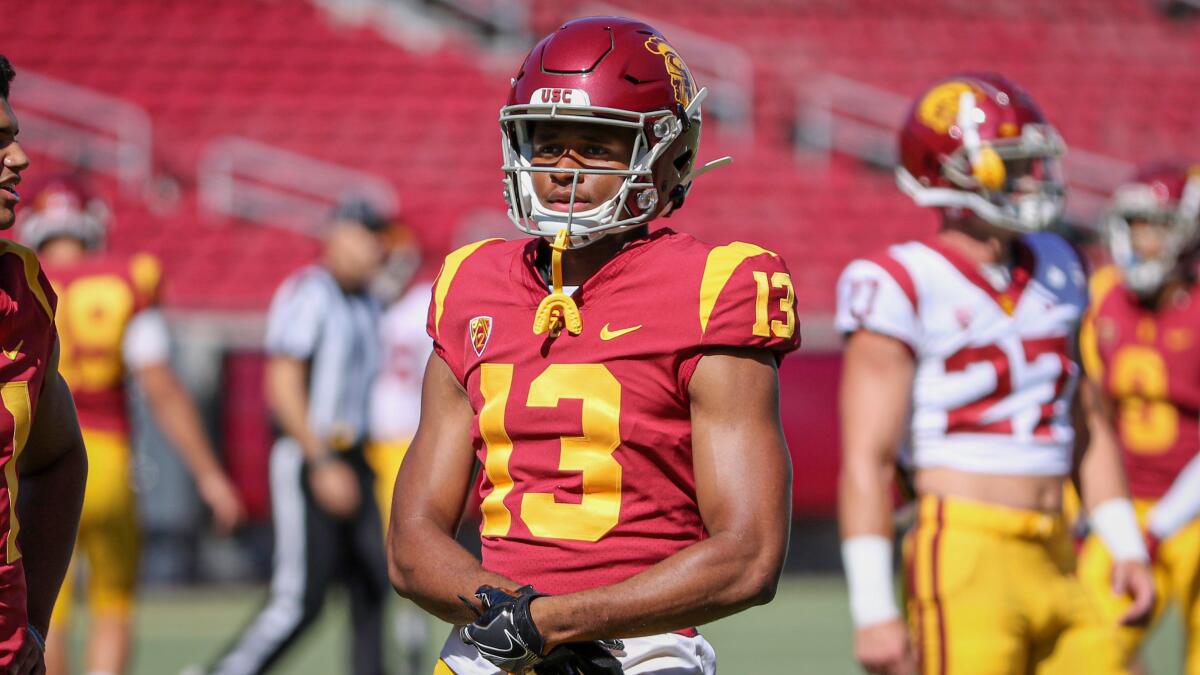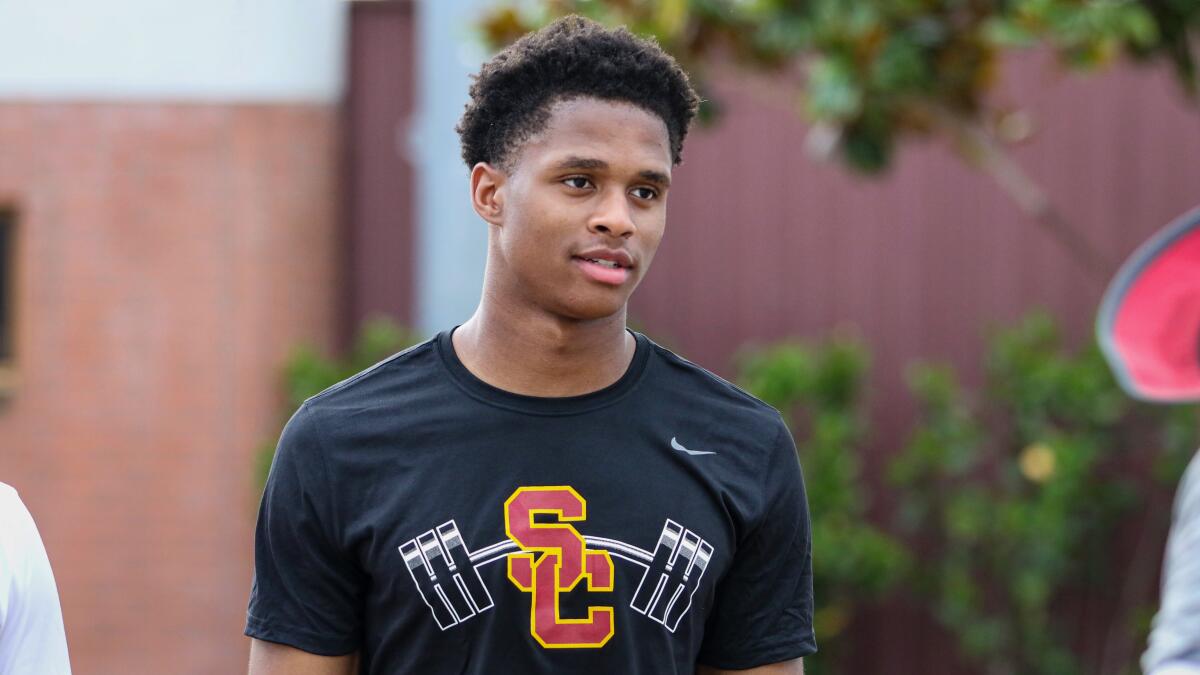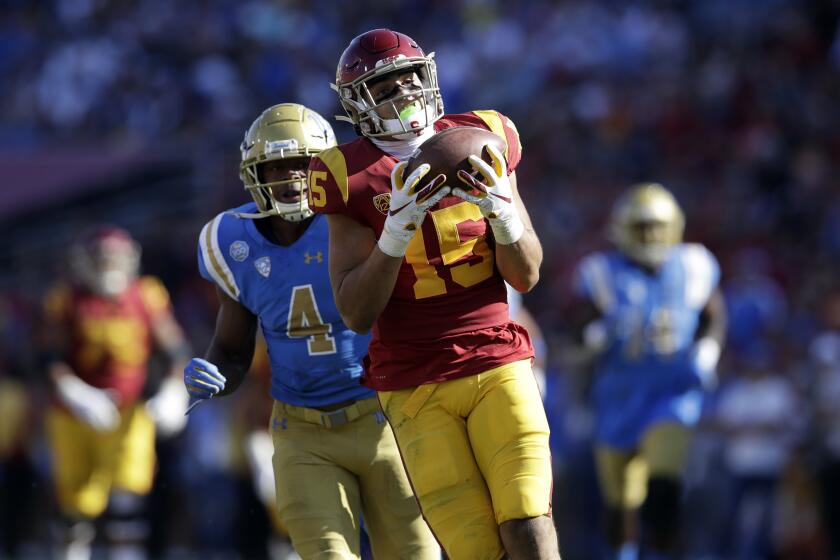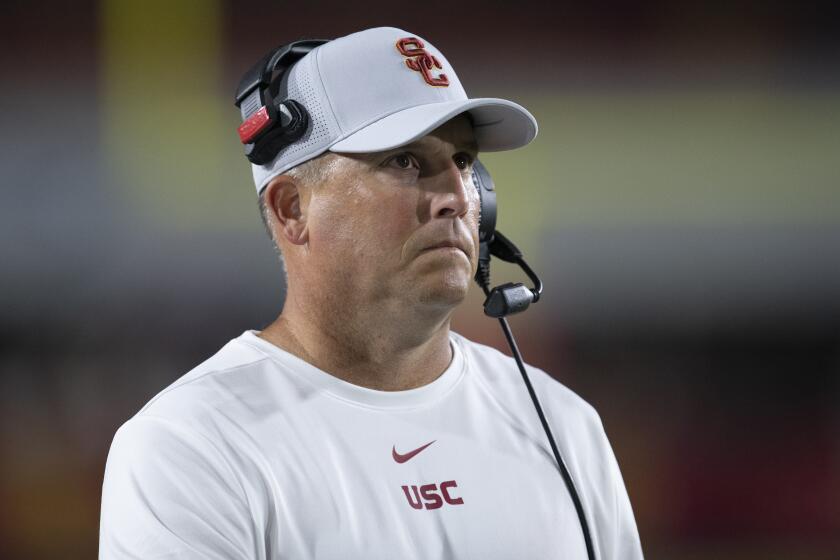A USC player filed for unemployment. A suspension and a visit from the feds followed

- Share via
The Pandemic Unemployment Assistance program was meant to help those unable to work because of the novel coronavirus, so Munir McClain assumed that he would qualify. The USC receiver, like so many other college athletes, had spent the previous few months stuck at home, unable to play or practice. The income he earned reselling high-end sneakers, which sometimes yielded up to $1,000 a pair, had slowed during the pandemic, and money was tight.
So he filed for PUA, which in California promised a minimum benefit of $767 per week. Months later, the state accepted his claim, and McClain pocketed the money, with plans to invest it in a new apparel brand he started with his siblings, BeenFree.
But by mid-September, with a postponed football season fast approaching, USC had suspended McClain.
On Sept. 16, Michael Blanton, USC’s vice president of ethics and professionalism, called McClain to ask what he knew about unemployment benefits from the Employment Development Department, according to his mother Shan.
Trojans sophomore receiver Drake London spent his quarantined summer focused on getting faster, playing more physically and tightening up his route running.
Two days later, the sophomore was suspended. When Shan called Blanton in search of an explanation, Blanton told her that a complaint had been filed about USC students being approached with a plan to apply for EDD benefits.
“He said Munir’s name came up,” Shan recalled. Still, the specifics remain unclear, even to McClain and his family.
USC coach Clay Helton declined last week to comment on the situation.
McClain had been away from the team for over a month when, on Tuesday morning, there was a knock on the door of the dormitory he shares with his older brother, Abdul-Malik. Two federal agents had arrived.
They asked Munir to speak to his brother. But Abdul-Malik, a redshirt sophomore linebacker for the Trojans, wasn’t present. So one of the investigators, Cynthia Penilla, left a business card for him identifying her as a special agent in the U.S. Department of Labor-Office of Inspector General. The card also said she was in the Office of Labor Racketeering and Fraud Investigations.
Abdul-Malik McClain wasn’t the only USC football player to whom investigators were interested in speaking. Others were approached in recent days at their USC dorms or apartments by investigators inquiring about Munir, according to a person affiliated with USC who was not authorized to speak publicly because of the sensitivity of the matter.
A video reviewed by The Times shows investigators stopping one player on a campus sidewalk. When the player refused to answer questions, an investigator pulled a document from his binder and instructed the player to show up at a listed address on Nov. 4 at 9 a.m.

A representative for the U.S. Office of the Inspector General said in an email: “Our office does not confirm or deny investigations.”
USC said in a statement that it was “cooperating with the authorities.”
“We understand there may be many questions and concerns,” the university’s statement read, “but we are unable to discuss this matter because of our obligation to protect students’ privacy.”
The McClains are resolute in their belief that Munir has done nothing wrong. Mark Hathaway, a lawyer retained by the family, told The Times on Thursday that the family plans to challenge his suspension at USC.
The NCAA does not bar athletes from earning income, either from outside businesses or through self-employment, as long as permission is granted and their name, image or likeness are not to promote said business. NCAA rules do not cover unemployment benefits, and a representative confirmed to The Times that such assistance would not affect an athlete’s eligibility.
Munir McClain is not the only college student to file for temporary unemployment benefits under PUA. College students aren’t eligible for normal unemployment insurance, but the new, temporary benefits program expanded eligibility to include self-employed people, gig workers, independent contractors, part-time workers and those with a limited work history. In April, the Department of Labor clarified that full-time students who worked part-time may qualify, if they meet certain requirements.
Andrew Stettner, a senior fellow at the Century Foundation and national expert on unemployment insurance, said that many college students have been misinformed about who’s actually eligible.
“You can’t just be a student who wasn’t working and get PUA, unless you had a job offer,” Stettner said.
USC coach Clay Helton says he’s noticed benefits from the Trojans’ unprecedented start to an unusual, pandemic-shortened season.
But with minimal scrutiny at the state level, he explained, “a lot of college students are getting it. The wrong message has gotten out there.”
The state EDD office would not offer any comment on the status or validity of a specific claim. But the arrival of federal agents on USC’s campus could suggest that the basis for their investigation goes beyond the legitimacy of a single claim for pandemic unemployment benefits.
Though, even after meeting him face-to-face in the doorway of his dorm room, investigators have yet to question Munir. Since he was suspended on Sept. 18, USC has yet to interview Munir, either.
Shan McClain is still trying to understand why.
“I believe that the truth will always prevail,” Shan said. “He hasn’t harmed or hurt anyone, but he’s been suspended from the team.”
More to Read
Go beyond the scoreboard
Get the latest on L.A.'s teams in the daily Sports Report newsletter.
You may occasionally receive promotional content from the Los Angeles Times.









